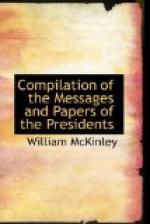It is fitting that I should bear testimony to the patriotism and devotion of that large portion of our Army which, although eager to be ordered to the post of greatest exposure, fortunately was not required outside of the United States. They did their whole duty, and, like their comrades at the front, have earned the gratitude of the nation. In like manner, the officers and men of the Army and of the Navy who remained in their departments and stations faithfully performing most important duties connected with the war, and whose requests for assignment in the field and at sea I was compelled to refuse because their services were indispensable here, are entitled to the highest commendation. It is my regret that there seems to be no provision for their suitable recognition.
In this connection it is a pleasure for me to mention in terms of cordial appreciation the timely and useful work of the American National Red Cross, both in relief measures preparatory to the campaigns, in sanitary assistance at several of the camps of assemblage, and later, under the able and experienced leadership of the president of the society, Miss Clara Barton, on the fields of battle and in the hospitals at the front in Cuba. Working in conjunction with the governmental authorities and under their sanction and approval, and with the enthusiastic cooperation of many patriotic women and societies in the various States, the Red Cross has fully maintained its already high reputation for intense earnestness and ability to exercise the noble purposes of its international organization, thus justifying the confidence and support which it has received at the hands of the American people. To the members and officers of this society and all who aided them in their philanthropic work the sincere and lasting gratitude of the soldiers and the public is due and is freely accorded.
In tracing these events we are constantly reminded of our obligations to the Divine Master for His watchful care over us and His safe guidance, for which the nation makes reverent acknowledgment and offers humble prayer for the continuance of His favor.
The annihilation of Admiral Cervera’s fleet, followed by the capitulation of Santiago, having brought to the Spanish Government a realizing sense of the hopelessness of continuing a struggle now become wholly unequal, it made overtures of peace through the French ambassador, who, with the assent of his Government, had acted as the friendly representative of Spanish interests during the war. On the 26th of July M. Cambon presented a communication signed by the Duke of Almodovar, the Spanish minister of state, inviting the United States to state the terms upon which it would be willing to make peace. On the 30th of July, by a communication addressed to the Duke of Almodovar and handed to M. Cambon, the terms of this Government were announced substantially as in the protocol afterwards signed. On the 10th of August the Spanish reply,




